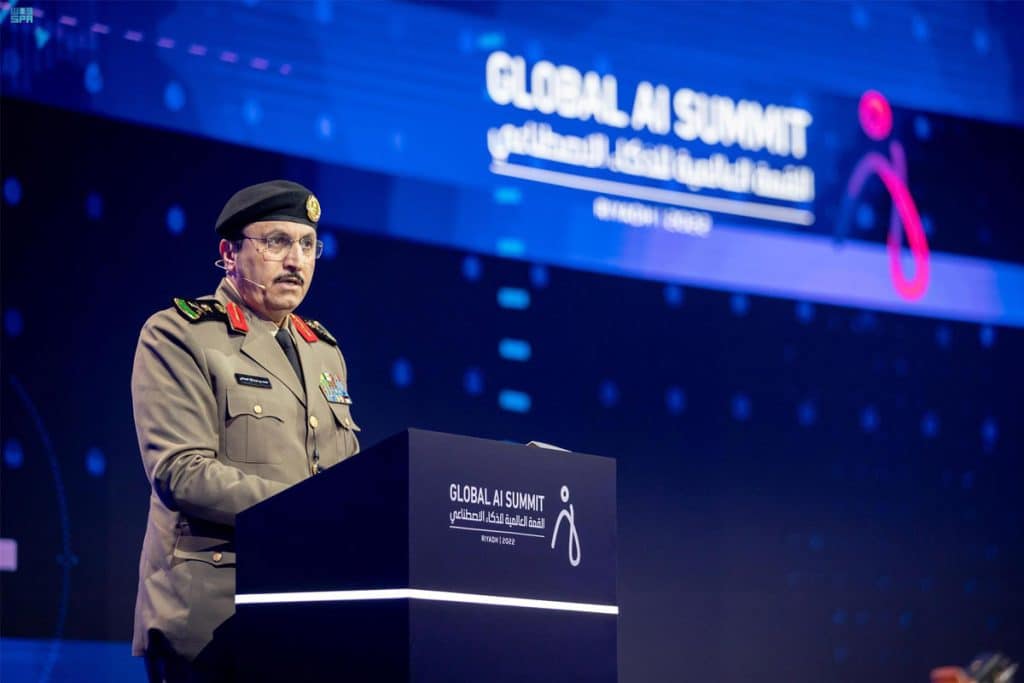Saudi Arabia is developing more advanced artificial intelligence algorithms and will use drones to streamline crowd control measures further and ensure that pilgrims and visitors are safe and comfortable while at the Two Holy Mosques in Mecca and Medina.
Announcing this at the ongoing Global AI Summit, Lieutenant General Mohammed Al-Bassami, Director of Public Security at the Ministry of Interior, said that his ministry, represented by the Special Forces for the Security of Hajj and Umrah, and the Saudi Data and Artificial Intelligence Authority (SDAIA) have formed a strategic partnership on developing algorithms to upgrade services at the two holiest sites of Muslim world.
Al-Bassami was speaking during a panel discussion titled ‘Holistic Adoption of AI Technology’ in the three-day Summit, which is being held at the King Abdulaziz Conference Center in Riyadh and closes on September 15.
The Lt Gen discussed the Kingdom’s crowd management as efforts are being made to increase the capacity to receive visitors and Hajj and Umrah pilgrims at the Two Holy Mosques, in line with the targets of the Kingdom’s Vision 2030.
Al-Bassami added that such a massive effort requires countless man-hours and an army of personnel working around the clock to provide the best possible service, which has helped the Kingdom gain vast expertise over several decades.
Al-Bassami explained to the Summit how AI is used as a tool to ensure the quality of those services.
“AI technologies introduced recently at the Two Holy Mosques have been helping greatly in keeping crowds under control as they enter and leave, thanks to faster decision-making, while ensuring that no more than the right number of people are present anywhere around the Holy Mosques at any given time,” said Al-Bassami.
“A set of capabilities had been worked out using artificial intelligence, establishing a platform called ‘Aamin’ (meaning ‘safe’ in arabic), and we are cooperating with a number of companies to establish data analysis centers. This is in addition to empowering security men deployed in the field in using technology directly through several applications, apart from automated monitoring systems.”

Saudi Arabia ramped up its security and safety measures for the visitors of Mecca and Medina after the unfortunate incident in September 2015, when a stampede started and left more than seven hundred people dead.
Dr Majed Altuwaijri, Chief Executive Officer of the National Center for Artificial Intelligence (NCAI), said that the cooperation comes as part of NCAI’s efforts to develop AI solutions for applications across various national sectors, and that the organisation helped develop AI solutions that contribute to enhancing the provision of the best possible service for the pilgrims.
Al-Bassami pointed out that the Ministry of Interior has multiple plans in place to manage crowds and move people in and out of the Two Holy Mosques with real-time monitoring.
He added that AI enables enhanced coordination and integration among many agencies to achieve the overall goal of making the Pilgrimage experience smoother and safer.
Al-Bassami said there are big opportunities to use AI in carrying out the tasks of Hajj and Umrah pilgrimages through facilitating the identification of pilgrims. It can help find lost pilgrims, apart from the management of crowds.





